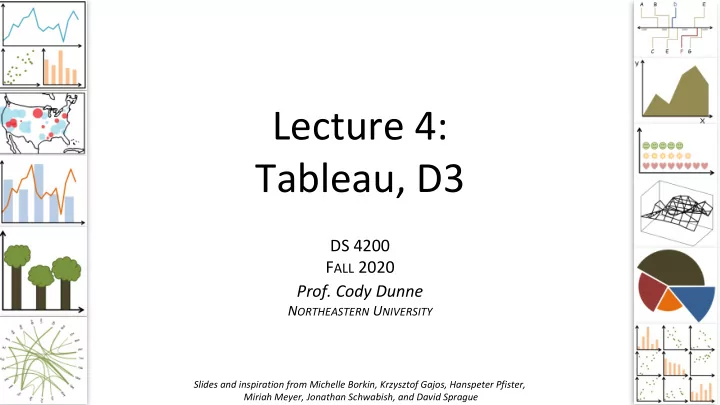

Lecture 4: Tableau, D3 DS 4200 F ALL 2020 Prof. Cody Dunne N ORTHEASTERN U NIVERSITY Slides and inspiration from Michelle Borkin, Krzysztof Gajos, Hanspeter Pfister, 1 Miriah Meyer, Jonathan Schwabish, and David Sprague
C HECK - IN 3
P REVIOUSLY , ON DS 4200… 4
A SSIGNMENT /P ROJECT DEADLINES : T 11:59 PM 5
A SSIGNMENT 2 B — W HO L IVES IN THE S OUTH E ND ? (T ABLEAU ) N OW D UE F 11:59 PM 6
JS T IPS AND T RICKS Slides and inspiration from Sara Di Bartolomeo 7
✓ Final Project validation Threats to Validity ✓ ✓ ✓ Final project follow-up 8
P ROJECTS (Using the nested model via design study “lite” methodology ) https://northeastern.instructure.com/courses/18721/pages/project-overview 9
P ROJECTS In-class project pitches: M 2020-09-30 What questions do you have for me? 10
N OW , ON DS 4200… 11
T ABLEAU T UTORIAL 12
I N -C LASS T OOL I NTRODUCTION — T ABLEAU ~25 min total 13
D3 T UTORIAL 14
Data Driven Documents
Data Driven Documents https://d3js.org/ ● D3 is a javascript library to manipulate documents based on data. ● → not a data visualization library (it’s not like plotly, not matplotlib, ...) D3 is not a Data Visualization Library - Elijah Meeks → no out of the box charts (no functions to automatically build a chart)
Meeks, 2018
Meeks, 2018
Vector (svg) vs. raster (canvas, png, jpg, ...) Formulas that describe the lines and points Describe the color content of each pixel • • that make up an image Will appear blurry/pixelated if you zoom in • Independent from the size of an image too much • Always looks crisp, no matter how much • you zoom in or distort the picture Graphics in SVG will be heavier to process • Minervini, 2017
SVG <svg> tag. E.g., <svg width='500' height='500'> ❏ can add <style> attributes ❏ Basic SVG shapes: rect, circle, line, text, polyline ❏ Can group elements using the <g> tag ❏
svg = d3.select('body').append('svg') .attr('width', 200) .attr('height', 200) var circle = svg.append('circle') .attr('cx', 30) .attr('cy', 30) .attr('r', 20) .attr('fill', 'black') Example: drawing
Selections Selections: .s elect ('selectors’) .s electAll ('selectors’) .select('tagname') // select by name of the element .select('#id') // select by id of the element .select('.classname') // select by class name More info on selections: https://bost.ocks.org/mike/selection/ Example: selections-GoT
Data Binding Data can be added in a number of different ways Simplest way is through→ .data( ) The .data( ) method joins the current selection with entries in your dataset
Data Binding Bostock, 2013
Data Binding Bostock, 2013
Data Binding Bostock, 2013
Data Binding Bostock, 2013
Data Binding If you ever get lost: “How selections work :” https://bost.ocks.org/mike/selection/ Example: data_binding
Modifying Elements text( ) // changes the text of the selection ● html( ) // allows you to modify the html ● append( ) // add element to the last child of the selection ● insert( ) // adds element to a more specific position ● remove( ) // deletes element ●
Controlling Attributes style( ) // gives access to any CSS styles ● classed( ) // allows you to toggle classes on and off ● attr( ) // allows you to access any attributes ● property( ) // almost same as attr() ● Example: selections-GoT
Linear Scales Domain 0 ……….. 10000 scaleLinear( ) // Quantitative attributes ● domain( ) // Original values that you will modify ● range ( ) // Values that we want to scale our data to ● 0 … 100 Range
Ordinal Scales scaleBand( ) // categorical attributes ● domain( ) // original values that you will modify ● range ( ) // Values that we want to scale our data to ● padding() // e.g., to control the spacing in between the bars ●
Recommend
More recommend